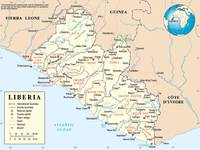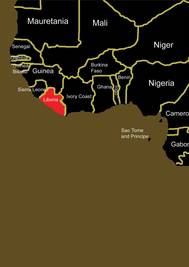Children's Village Liberia
The banner with its horizontal red and white stripes resembles the US banner, although with 11 instead of 13 stripes. It also shows the blue area in the left upper corner showing 1 big star instead of 50 little stars.
Liberia's capital is named Monrovia after the US president James Monroe who declared the colonisation of the New World to be over.
The currency is the Liberian Dollar, the official lenguage is English.
The History Of Liberia
Liberia was founded by freed American slaves in 1847. Until to-day this may be considered as the background of one of the poorest countries in the world.

Research has reveiled that the region of Liberia was inhabited by different immigrated negroid ethnic groups between the 12th and 14th century, recorded arrivals were the Mende, Kru, Bassa, who first and foremost lived on farming.
In the middle of the 15th century the Portuguese discovered the so-called pepper-coast (this refers to the coastal area of the Atlantic Ocean) and sporadically traded with the locals.
The region was considered as an important trading centre for ivory, spices and slaves and thus got into the focus of other European countries. Nevertheless, the installation of trading posts failed due to the broad resistance of the coastal population. In the beginning of the 19th century, the American Colonization Society (ASC) started to move free African-American slaves to a sliver of land in the east of Cape Medurado. At first, these settlements which form today's Monrrovia, were governed by the American administration.
Against the withstanding local population, the land was colonized and the independent Republic of Liberia proclaimed, principally based on the American Constitution.
The immigrated former US-slaves, even being a minority, formed the elite group in politics and economy. They established a sort of apartheid leading to massive suppression of the local population. After a short economic boom and final fixation of its borders by the end of the 19th century, Liberia became strongly dependent on the United States after the 1st world-war, mainly due to American trusts in the country.
Notwithstanding all governmental efforts to settle ethnic conflicts, mainly by the presidents Tubman (1943-1971) and Tolbert (1971-1980), the tensions eventually lead to uproar, riots and demonstrations in 1979.
A military coup and the murder of Tolbert resulted in a military regime under Samuel Kanyon Doe, a representative of the indigeneous African population. Doe annihilated the constitution and brutally repressed all opposition and persecuted various ethnic groups.
In 1989 the broad resistance against the despotism of the president, mainly by the National Patriotic Front of Liberia and its leader Charles Taylor, resulted in a long and bloody civil war. After the killing of Doe and Taylor being elected as president, the ethnic conflicts, however, did not cease, notwithstanding the intervention of the West African peace forces.
In 2003 conflicts with rebel groups flared up again leading finally to Taylor's fall. After broad peace negotiations the parties involved agreed to nominate Charls Gyude Bryant as transitional president and to station a multinational peacekeeping force.
By free and democratic elections in 2005 Ellen Johnson-Sirleaf was elected as president, which was a novum on the African continent. Liberia established a Truth and Reconciliation Commission to clear the history of civil war.


